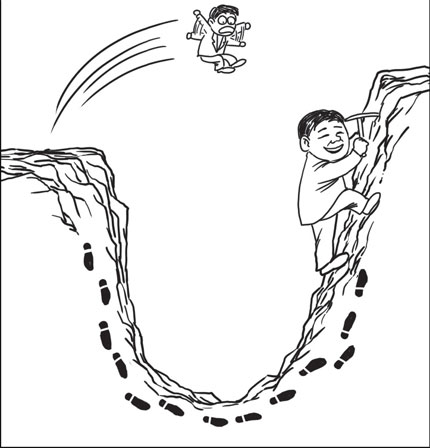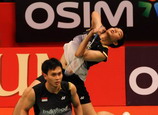
 |
| (Illustration by Zhou Tao) |
LESS than 30 years from near-bankruptcy to global leadership; reinvention at least three times; trusting nearly 80,000 people to accept leadership roles in self-organizing, autonomous work units.
Is it yet another new economy, Silicon Valley razzamatazz success story? Not at all.
This is about a Chinese company making home appliances, and it's an incredible story about what is possible in old-economy, commodity markets.
It seems as if every form of business media today has gone gaga over start-up type success stories, with a group of twenty-something Silicon Valley entrepreneurs creating yet another miracle success, seemingly out of thin air.
Yet, here is a company that was on the verge of bankruptcy in 1984, suffering from undisciplined workers, poor management, and more than 1.4 million yuan (US$228,290) in debt. Twenty-eight years later, it has become the world's largest home appliance manufacturer with a nearly global sales presence, and revenues of over US$27 billion.
The company is Haier, now one of China's most recognized global brands, and the products are as prosaic as washing machines and refrigerators.
While there might be some youngsters running around with new ideas, this is the story of everyday, average people, led by a mature leadership team, showing what they can do when it comes to business model reinvention.
Not another 'China story'
Don't let the Chinese part of this story mislead you; this is not just another "China story" of incredible wealth generation.
While China has certainly demonstrated astonishing growth and prosperity over the last 30 years, it is sobering to recall that not all Chinese companies survived the economic turbulence that accompanied this great success. Few of the China Winners have been as successful as Haier, and as a result, we believe there are lessons in Haier's story that should be valuable to managers in any industry and any market.
Innovation has been a core competency of Haier, at least since the fabled development of a washing machine to clean up fruits and vegetables for the free markets that were sweeping across China in the mid-1980s.
But what has distinguished Haier has not been product innovation, as important as that has been, but business model innovation, with a focus on zero distance to the customer.
Under the leadership of CEO Zhang Ruimin, Haier has launched new efforts to reinvent its business model and corporate culture before a "burning platform" was required. It is so much easier to make big changes when optimism prevails and resources are abundant.
In addition, Haier has never made a big strategic move, no matter how revolutionary, without relying upon a foundation of what it already knows. Haier's story is "revolution by accretion," rather than revolution without references to the past. The household appliance industry in China has been a graveyard for well-intentioned, well-endowed and well-known firms.
Quite a few global household appliance incumbents literally "lost their way" in entering the China market (eg, Electrolux and Whirlpool). Some even lost their home market while attempting foreign expansion (eg, Maytag's loss of leadership in the US market).
Haier, however, has won on the same battlefield. It has also established manufacturing plants in the US and Europe, and acquired New Zealand's appliance giant Fisher & Paykel and Sanyo's home appliance business in Japan.
Haier is an example of how the same daring strategic moves that we typically ascribe to new-economy start-ups can succeed in a giant, mature firm in a commodity-type business.
















 The Bund turns into beach as the temperature reaches high
The Bund turns into beach as the temperature reaches high


![]()
